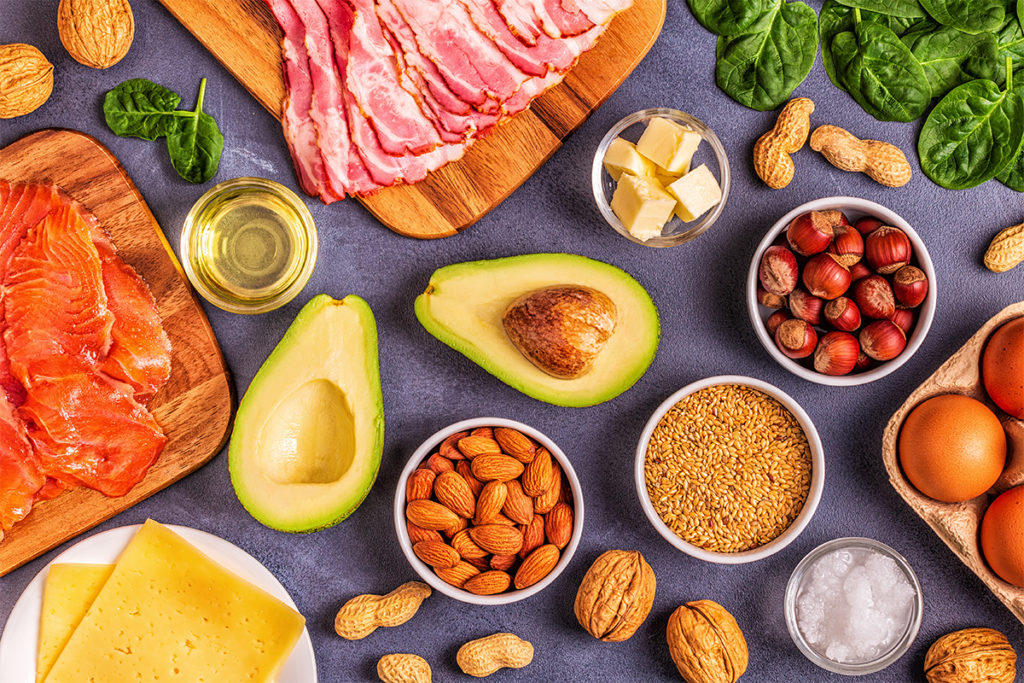Sponsored Content
What’s the Word on Keto for Weight Loss?
A nutrition expert sounds in with the answers to the questions your clients are asking about keto.

Finally! Gone are the days where fats were a 4-letter word. Research has dispelled the myth that a diet rich in energy-dense butter, marbled meats, and nuts can make you, well, fat. Informed eaters are now seeking out formerly forbidden coconut oil, fatty fish, and ALL the avocados.
Satiating and nourishing fats should have a presence in the diet, no matter the specific health or wellness goals at hand. Dietary fat provides energy, facilitates vitamin and mineral absorption, and is uniquely positioned to support the body when carbohydrate is limited or non-existent, like for those on a keto diet. During ketosis, the body is starved of glycogen and is forced to rely on fat, in the form of ketones, to support brain function and other physiologic processes (Gershuni, Yan, & Medici 2018).
A properly designed keto diet requires a high intake of dietary fat, a moderate intake of protein, and a very low intake of carbohydrate. But is this approach to eating reasonable? Here’s a look at what you need to know about keto and whether it can support your client’s quest for weight loss.
Know Before You Go
Does a day fueled by cheese, eggs, nuts, avocado, fatty fish, bacon, leafy greens, and coconut oil sound good? Ready to put aside carb-rich grains, fruits, and starchy veggies? Ready to meal prep and track macros? It takes work to achieve the higher levels of ketones that can result from an intake close to 75% of calories from fat, 20% from protein, and 5% from carbs. Experts (Young et al. 1971; Wilson & Lowery 2017; Wilson et al. 2017) suggest that individuals who reduce overall caloric intake and consume a diet designed around this 75/20/5 macronutrient blend can experience significant weight loss and primarily from fat rather than metabolically active muscle mass.
Making Keto Work
Change won’t happen overnight; allow 3–5 weeks to fully adapt and expect significant changes during the first week as the body transitions from glycogen to ketones as a fuel source. Be generous with hydration and electrolytes (diuresis and dehydration can make life miserable!) but not with cheat days; the benefits of keto are closely tied to adherence and ketone levels so the more strictly you stick to the macros, the better. Busy, on-the-go individuals can prepare for success by thinking through how to fuel the entire day. Remember: keto fast food doesn’t exist and most convenience items are packed with carbs and sugar! In a pinch, grab carefully designed convenience options like a ZonePerfect keto shake with the appropriate keto macros.
The Science of Weight Loss
Keto is a popular choice because, done right, it actually works to promote weight loss and improve body composition. Moreno et al (2016) compared the effects of a low-calorie ketogenic diet (LCKD) vs. a standard low-calorie diet (LCD) and found LCKD results in both fast and longer-term weight loss. At 24 months, the diet resulted in greater reductions in body weight, waist circumference, and body fat mass. In those who completed the program, there were significant effects on weight loss at 2 weeks, 2 months, 4 months, 6 months, 12 months, 18 months, and 24 months.
Parting Thoughts
Think of keto as a tool in your arsenal to fight obesity and metabolic syndrome. It’s not for everyone, including but not limited to individuals with a genetic predisposition for elevated lipid levels, or pregnant women. Many athletes report altered performance when cutting carbs, especially in early phases. Still, keto can be a great option for those looking to break from the ups and downs of a high sugar diet. For clients who’ve failed at countless diets and returned to old habits once hunger hits, this appetite-reducing and satiating option might be a good fit. Thus, the ketogenic diet is now an accepted option for those looking for weight loss, improvements in health markers, and looking to enjoy a thoughtful intake of the high fat foods once considered off limits.
References
Gershuni, V.M., Yan, S.L., Medici, V. 2018. Nutritional ketosis for weight management and reversal of metabolic syndrome. Current Nutrition Reports, 7, 97–106.
Moreno, B., et al. 2016. Obesity treatment by very low-calorie-ketogenic diet at two years: reduction in visceral fat and on the burden of disease. Endocrine, 54 (3), 681–690.
Wilson, J., & Lowery, R. 2017. The Ketogenic Bible. Canada: Victory Belt Publishing, 13, 19–20, 42–47, 68–69, 351.
Wilson, J., et al. 2017. The effects of ketogenic dieting on body composition, strength, power, and hormonal profiles in resistance training males. J Strength Cond Res.
Young, C.M., et al. 1971. Effect on body composition and other parameters in obese young men of carbohydrate level of reduction diet. Am J Clin Nutr, 24 (3), 290–296.




